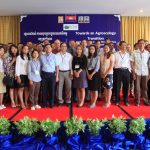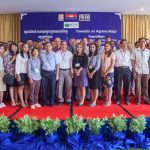
24 downloads
Title of document: Profiles of participants attending the multi stakeholder workshops on agroecological transition in the Mekong Region Authors: ALiSEA Team Ministry/Government Agency/Organisation: ALiSEA Year of publication: 2016 Geographic focus: Cambodia, Laos, Myanmar & Vietnam Summary: These 4 documents compile short biographies and contact details of most of the participants who have attended the 4 national multi-stakeholder workshops addressing Agroecological Transition in the Mekong Region organized between March and June 2016 (Myanmar, Cambodia, Vietnam Lao PDR). Read More

31 downloads
Title of document: Consolidated account of the 4 national multi stakeholder workshops on agroecological transition in the Mekong Region Authors: Pierre Ferrand Ministry/Government Agency/Organisation: ALiSEA Year of publication: 2016 Geographic focus: Cambodia, Laos, Myanmar & Vietnam Summary: This report presents a short consolidated account of 4 national multi-stakeholder workshops addressing Agroecological Transition in the Mekong Region and bringing together 225 participants that have been organized between March and June 2016 (Myanmar, Cambodia, Vietnam Lao PDR). Such workshops aimed at sharing knowledge, information and actions between agricultural development stakeholders. Read More

29 downloads
Title of document: Proceedings of the national multi stakeholder workshop on Agroecology Transition, Cambodia Authors: Lucie Reynaud, Pierre Ferrand and Dr Saythong Vilayvong Ministry/Government Agency/Organization: ALiSEA Year of publication: 2016 Geographic focus: Cambodia This report presents the main findings of the discussions held during the 2 days workshop addressing the agroecology transition in Cambodia in Phnom Penh on the 30th and 31st of March 2016. Read More
93 downloads
Title of document: Agroecology Stakeholder Mapping and Situation Review in Cambodia Authors: Proyuth Ly and Samphiron Sar Ministry/Government Agency/Organization: GRET Year of publication: 2016 Geographic focus: Cambodia The current report presented results from a study on agroecology stakeholder mapping and situation review in Cambodia conducted within the framework of AFD’s funded regional project “Toward Agroecology Transition in the Mekong Region”, implemented by GRET. The study is one of the four studies, conducted in parallel in four countries including Cambodia, Lao PDR, Myanmar and Vietnam. The overall objective of the study is to map agroecological initiatives at local and national level and provide a more detailed and accurate account of ongoing initiatives promoting agroecology across the region. The study involves desk reviews including national policy framework, technical reports, articles, books addressing the six identified agroecological practices (SRI, IPM, Organic Agriculture, Integrated Farming, Conservation Agriculture and Agroforestry), interviews with 21 actors actively promoting agro-ecological practices, and field visits to the outstanding sites in four provinces (Kampong Speu, Kandal, Takeo and Siem Reap). The results of the study is divided into five sections: a review of Cambodia’s policy/regulatory frameworks addressing agro-ecological practices, sustainable development, poverty reduction, food security, GI, GAP etc.; status of the six identified agroecological practices and enabling environment; stakeholder mapping and their account of ongoing initiatives; existing networks promoting agroecology; and stories from the fields. Read More
12 downloads
Title of document: The tyranny of taste: The case of organic rice in Cambodiaapv_1458 Authors: Maylee Thavat Ministry/Government Agency/Organisation: Resource Management in Asia-Pacific Program, Crawford School of Economics and Government, Australian National; University, Coombs Building, Fellows Road, Canberra, ACT 0200, Australia. Year of publication: 2011 Geographic focus: Cambodia Main issues / topics addressed: agrarian transition, Cambodia, consumption studies, organic agriculture, post productivism School of agroecology: Organic Agriculture Fair-trade and organic products are often sold at price premiums justified by smaller production volumes that are associated with greater social and environmental responsibility. The consumption of these products confers on the consumer a greater sense of morality – and usually a claim to better taste. This paper tells the story of attempts to promote organic/fair-trade rice production by de facto organic Cambodian farmers for export to North American and European markets in order to assist poor farmers to trade their way out of poverty. It demonstrates that instead of promoting sustainable agriculture and fair trade between developed and developing markets, organic/fair-trade projects may impose First World consumer ideals and tastes that are out of step with the larger realities of agrarian transition in Cambodia and the wider region of developing Southeast Asia. Read More
20 downloads
Title of document: Agricultural Systems Authors: Proyuth Ly (University of Copenhagen); Lars Stoumann Jensen (University of Copenhagen); Thilde Bech Bruun (University of Copenhagen); Dominik Rutz (University of Bern), Andreas de Neergaard (University of Copenhagen). Ministry/Government Agency/Organisation: Department of Plant and Environmental Sciences, Faculty of Science, University of Copenhagen, Thorvaldsensvej 40, DK-1871 Frederiksberg C, Denmark; Centre for Development and Environment (CDE), University of Bern, Switzerland Year of publication: 2012 Geographic focus: Cambodia Main issues / topics addressed: Farming system; Adapted practices; Water control; Labour inputs; Socio-economic and agro-ecological conditions School of agroecology: System of Rice Intensification (SRI) The System of Rice Intensification (SRI) has been widely promoted in Cambodia and a significant number of adopters have been reported. However, little is known about the specific conditions regarding the adapted practices of SRI, how the local rice production practices are influenced by SRI principles and the outcomes of the adaptation. This paper seeks to describe reported differences in rice farming practices as influenced by SRI practices in two regions of Cambodia, evaluate reported outcomes by type of rice farming systems and analyze farmers’ perception of the relevance of SRI practices for their socio-economic and agro-ecological conditions. We conducted a survey with 207 farmers in two districts: Tramkak in the Takeo province and Santuk in the Kampong Thom province. The study revealed that the full SRI package was not generally adopted by farmers but the introduction of SRI did have a strong influence on conventional rice farming practices in the study areas. As the SRI practices adopted by farmers represent modifications of textbook SRI principles, we call the practices ‘‘SRI-influenced practices – SRII’’. The farmers’ experience demonstrated that the implementation of some SRI practices is constrained by labour availability and agro-ecological conditions. This results in a diversity of adapted practices of SRI being implemented by individual farmers. The requirement of skilled and committed labour at transplanting explained the fact that most of the SRII farmers could not apply SRII in their entire paddy fields. The intensive labour demand in SRII was reflected in the scepticism of non-adopters and disadopters for not trying or discontinuing SRII. Intermittent irrigation as recommended in SRI is very difficult to apply due to poorly developed infrastructure and because farmers are reluctant to drain water in case the next rains are delayed. In terms of crop yields and economic return, farmers reported higher yields for plots managed under SRII practices and we estimated lower cash investment costs. However, the estimated full economic costs for plots with SRII practices were higher than for conventional practices, and the mean net income did not differ between practices. Average returns to labour also did not differ significantly for the different practices. Read More
17 downloads
Title of document: Country Strategy Paper Cambodia - Pesticide Risk Reduction “IPM Component”/Towards a non-toxic environment in South East Asia – Phase I Ministry/Government Agency/Organisation: FAO; FAO IPM; IPM, Cambodia Year of publication: 2013 Year / period of application: July 2010 - June 2013 Geographic focus: Cambodia Main issues / topics addressed: Pesticide Risk Reduction “IPM Component” School of agroecology: Integrated Pest Management (IPM) / Integrated Cropping Management (ICM) The Ministry of Agriculture, Forestry and Fisheries (MAFF) initiated the pilot phase of the Integrated Pest Management (IPM) Programme from 1993 to 1995 after “The Environment and IPM” workshop which was held at the Royal University of Agriculture, Phnom Penh. At that time Cambodia joined 12 other Asian countries as part of the FAO Inter-Country Programme in Rice IPM in South and Southeast Asia with technical assistance and financial support from FAO (under TCP arrangements), IDRC and IRRI. FAO supported Cambodia in the implementation of a Season-long Training of Trainers Course (TOT), a Farmer Trainer Orientation Course (FTOC) and several Farmer Field Schools (FFS) in 1996 before Cambodia joined the FAO Southeast Asia Regional Vegetable IPM Programme (GCP/RAS/168/AUL) in 1997. Read More
7 downloads
Title of document: Conservation Agriculture workshop and conference in South East Asia Ministry/Government Agency/Organisation: Cirad; SANREM CRSP; USAID; FFEM, Fond Français pour l'Environment Mondial. Year of publication: 2011 Geographic focus: South East Asia School of agroecology: Conservation Agriculture Introduction to Direct seeding Mulch-based Cropping systems (DMC). Case study of adaptive research for the creation of DMC-based cropping systems for the Cambodian agriculture... Read More
17 downloads
Title of document: CONSERVATION AGRICULTURE, A 4 WINS SOLUTION FOR RAINFED AGRICULTURE IN MEKONG COUNTRIES: THE CASE OF CAMBODIA Authors: Stephane BOULAKIA (CIRAD); PEN Vuth (General Directorate of Agriculture, MAFF); SANN Vathana (Council for Agriculture and Rural Development); Stephane CHABIERSKI (CIRAD); Olivier GILARD (AFD). Year of publication: 2010 Geographic focus: Cambodia Main issues / topics addressed: Background Paper for Conference on the " The Environments of the Poor”, 24-26 Nov 2010, New Delhi School of agroecology: Conservation Agriculture In “Mekong” countries (Cambodia, Laos, Vietnam, …), the agricultural sector provides the livelihood for a greater share of the population than its share part of the GDP. Proportion of poors exceed the average national indicator and could increase due to the degradation of environment and climate change impact (soil fertility, erosion, increased population density … Read More
45 downloads
Title of document: Trainer’s Manual for Extension Workers - Organic Vegetable Production Ministry/Government Agency/Organisation: Ministry of Agriculture, Forestry and Fisheries, PDA Kandal; VVOB, Education for Development Cambodia Year of publication: 2012 Geographic focus: Cambodia Main issues / topics addressed: Organic Vegetable Production Vegetables are an integrated crop that Cambodian farmers like to grow the whole year round, especially in dry season after the rice harvest. Vegetables improve the nutritional level in the diet of farmers, increase household income and contribute to strengthening the national economy development. Vegetables are grown on high land and fallow land especially in the areas near the riversides which are full of fertile soil. Read More

 Asia & Mekong Region
Asia & Mekong Region  Cambodia
Cambodia  Laos
Laos  Myanmar
Myanmar  Other
Other  Vietnam
Vietnam